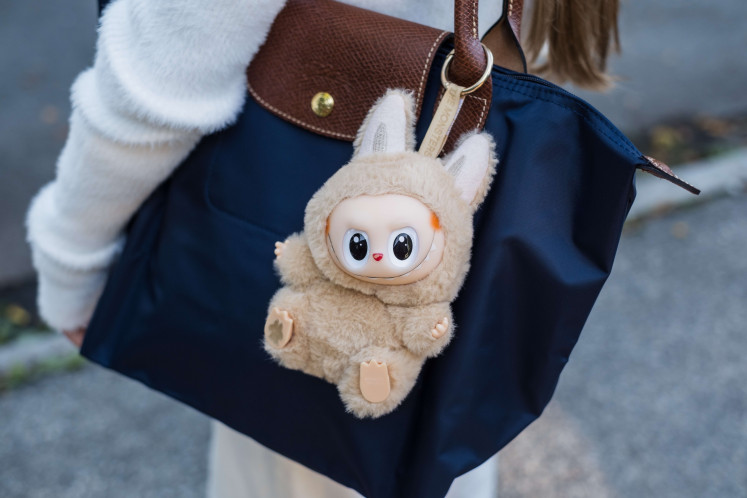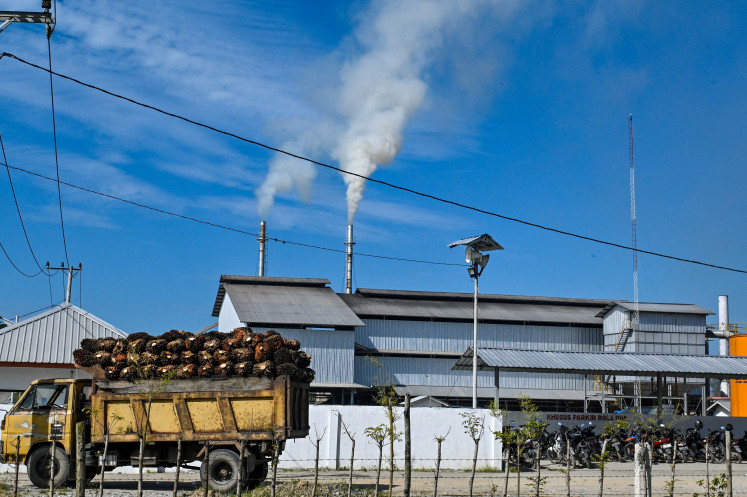Popular Reads
Top Results
Can't find what you're looking for?
View all search resultsPopular Reads
Top Results
Can't find what you're looking for?
View all search resultsEva Mazrieva: An Indonesian tiger mom in the US
Tiger mom: Senior journalist and author Eva Mazrieva (left) poses with her children
Change text size
Gift Premium Articles
to Anyone
 Tiger mom: Senior journalist and author Eva Mazrieva (left) poses with her children. She shared her experience of raising triplets and a daughter in her book, I Am a Tiger Mom.(Courtesy of Eva Mazrieva) (left) poses with her children. She shared her experience of raising triplets and a daughter in her book, I Am a Tiger Mom.(Courtesy of Eva Mazrieva)
Tiger mom: Senior journalist and author Eva Mazrieva (left) poses with her children. She shared her experience of raising triplets and a daughter in her book, I Am a Tiger Mom.(Courtesy of Eva Mazrieva) (left) poses with her children. She shared her experience of raising triplets and a daughter in her book, I Am a Tiger Mom.(Courtesy of Eva Mazrieva)
T
span class="caption">Tiger mom: Senior journalist and author Eva Mazrieva (left) poses with her children. She shared her experience of raising triplets and a daughter in her book, I Am a Tiger Mom.(Courtesy of Eva Mazrieva)
Juggling work and motherhood is never an easy task, especially if one lives far from families and friends, in a country with a completely different culture.
Senior journalist Eva Mazrieva has had to toughen up, creating her own particular parenting systems to manage the see-saw of her life in Washington DC
She shares her experience of raising triplets and a daughter and how she and her little family adjusted to a new life abroad in her book I Am a Tiger Mom, released late last year.
Eva wrote the 236-page book in just three months in 2013, but the editing and publishing process took longer than she expected ' in 2014, books on politics were more popular than parenting or feature books.
'The message I'm trying to convey is to never give up. I believe that there's always a way out of every hardship. God invites us to find new ways to solve problems, while at the same time testing our perseverance,' Eva told The Jakarta Post during a recent holiday and promotional visit to Jakarta.
In the book, Eva explains how problems have made her stronger.
For example, when the Indian Ocean Tsunami hit Aceh in 2004, she lost 43 relatives in the tragedy; the grief caused her father to suffer a stroke. Her determination to give her father a grandchild was intensified by the tragedy.
She had, for many years and through both medical and non-medical means, attempted to have children, but to no avail. She finally fell pregnant after undergoing in-vitro fertilization (IVF) in Singapore.
'I gave birth to two boys and a girl in February 2006, and two years later, I gave birth to another baby girl,' she said.

Eva's resilience was tested once again when she and her family moved to the US in 2010.
'We started everything from scratch. In Jakarta we had cars and a comfortable house, but in Washington, we live in a small apartment and go everywhere by public transportation,' she said.
Eva recalled a moment when she needed to put her kids in a shopping trolley in order to find a taxi during heavy snow, while others, unencumbered by offspring, had no problems finding one.
'After we found a taxi, the kids were freezing in the trolley; that made me so sad. But it taught me to keep working hard and save more money,' Eva said.
She also discusses the culture shock experienced by her children; they can no longer run around freely in the house because of the limited space, and are unable to play outside the house unaccompanied because of the high risk of kidnapping.
Eva and the family moved to the US after she quit her previous job at ANTV television station, having applied, and been granted, a position at Voice of America (VOA) Siaran Indonesia.
'I am used to working abroad, or at least being a correspondent for foreign media in Indonesia. I like how I can learn about other countries, as well as building networks and friendships,' she said.
After graduating from the social welfare department at the University of Indonesia (UI), Eva began her career in journalism in 1995, becoming a reporter for Arief Rachman Hakim radio and Trijaya FM. She then moved to SCTV in 1998 before becoming the correspondent of Japan's NHK TV in 1998 and Yomiuri Shimbun newspaper from 1999 to 2000.
She then worked for Radio Singapore International for six years, before taking a post at ANTV.
She has covered many historical and important events across the country, including the East Timur riots in 1999, the conflict involving the Free Aceh Movement (GAM) in Nanggroe Aceh Darussalam, further riots in Poso and Ambon and the country's first elections after president Soeharto stepped down.
Being a journalist in the US was a different experience for Eva. Her career in Indonesia had made her strong, allowing her to make friends with people from various backgrounds, and teaching her how to make decisions in a matter of seconds and have the courage to take responsibility for them.
'Meanwhile, being journalist in the US has taught me to have better journalistic ethics. You can't do candid interviews like you can in Indonesia, and you can't just record or take photos of sources without their consent,' the 44-year-old said.
In the US, Eva is her family's breadwinner, her husband Haryo Dewanto having left his job as a senior journalist at SCTV and become a stay-at-home dad ' something he would never have considered doing in Jakarta.
According to US Census data analyzed by the Huffington Post, an estimated 1.9 million fathers remain at home with their children, accounting for 16 percent of the stay-at-home parent population, a result of a difficult job market, high cost of child care and certain cultural issues.
'Both of us work together to do household chores. But when I'm off, I take care of the house, and Rio [Haryo's nickname] can occupy himself with his hobbies,' Eva said.
To make up for her absence from the family, she volunteers at her children's school: arranging books in the library, teaching children how to spell and giving talks on certain issues, including on journalism.
The family slowly managed to gain a better footing. She built her own support system in the neighborhood, maintaining good relationships with migrant families who lived in the same building.
'When my son Aditya fell from monkey bar in the playground, the neighbors came with us to the hospital. And at Christmas and Idul Fitri, they often share their traditional dishes with us,' she said.
'It is so heartwarming. All of the experience that we've had here has made us closer and more disciplined.'










